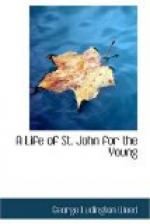“As
in death He hung,
His mantle soft on thee He
flung
Of filial love, and named
the son;
When now that earthly tie
was done,
To thy tried faith and spotless
years
Consigned His Virgin Mother’s
tears.”
—Isaac
Williams.—Trans. An. Latin
Hymn.
Blessed John. When Jesus called His own mother “thy mother,” didst thou not almost hear Him call thee “My brother”?
One tradition says that John cared for Mary in Jerusalem for twelve years, until her death, before his going to Ephesus. Another tradition is that she accompanied him thither and was buried there. What a home was theirs, ever fragrant with the memory of Him whom they had loved until His death. No incidents in His life, from the hour of brightness over Bethlehem to that of darkness over Calvary, was too trivial a thing for their converse. That home in Jerusalem became what the one in Nazareth had been, the most consecrated of earth. What welcomes there of Christians who could join with Mary as she repeated her song of thirty-three years before, “My soul doth magnify the Lord, and my spirit hath rejoiced in God my Saviour.” Of her we shall gain one more distinct view—the only one.
[Illustration: THE DESCENT FROM THE CROSS Rubens Page 200]
CHAPTER XXVII
John the Lone Disciple at the Cross—Continued
Three sayings on the cross reported by John:
“Woman, behold, thy son! Behold, thy mother!”
“I thirst.”
“It is finished.”
—John xix. 26, 27, 28, 30.
Of the seven sayings of Christ on the cross, three are preserved by John only; one of love, another of suffering, and another of triumph. The first is that to Mary and John himself. The second is the cry, “I thirst”—the only one of the seven concerning the Lord’s bodily sufferings. John was a most observing eyewitness, as is shown by the details of the narrative,—the “vessel full of vinegar,” the “sponge filled with vinegar,” and the hyssop on which it was placed, the movements of the soldiers as they put it to Christ’s lips, and the manner in which He received it. He was willing to accept it to revive His strength to suffer, when “He would not drink” the “wine mingled with gall” that would relieve Him from the pain He was willing to endure. The end was drawing near. The thirst had long continued. He had borne it patiently for five long hours. Why did He at last utter the cry, “I thirst”? John gives the reason. A prophecy was being fulfilled, and Jesus would have it known. It was this: “In My thirst they gave Me vinegar to drink.” So “Jesus, ... that the Scripture might be fulfilled, saith, ‘I thirst.’”
John watched Him as He took His last earthly draught. It was probably of the sour wine for the use of the soldiers on guard. What varied associations he had with wine,—the joyful festivities of Cana, the solemnities of the Upper Room, and the sadness of Calvary.




